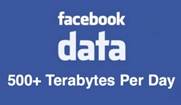Facebook Ingests 500+ Terabytes Every Day
 By Josh Constine, Wednesday August 22, 2012
By Josh Constine, Wednesday August 22, 2012
Facebook revealed some big, big stats on big data to a few reporters at its HQ today, including that its system processes 2.5 billion pieces of content and 500+ terabytes of data each day. It’s pulling in 2.7 billion Like actions and 300 million photos per day, and it scans roughly 105 terabytes of data each half hour. Plus it gave the first details on its new “Project Prism”.
VP of Engineering Jay Parikh explained why this is so important to Facebook: “Big data really is about having insights and making an impact on your business. If you aren’t taking advantage of the data you’re collecting, then you just have a pile of data, you don’t have big data.” By processing data within minutes, Facebook can rollout out new products, understand user reactions, and modify
designs in near real-time.
Another stat Facebook revealed was that over 100 petebytes of data are stored in a single Hadoop disk cluster, and Parikh noted “We think we operate the single largest Hadoop system in the world.” In a hilarious moment, when asked “Is your Hadoop cluster bigger than Yahoo’s?”, Parikh proudly stated “Yes” with a wink.
While that sounds like a lot to smaller businesses, he noted that in a few months “No one will care you have 100 petabytes of data in your warehouse”. The speed of ingestion keeps on increasing, and “the world is getting hungrier and hungrier for data.”
And this data isn’t just helpful for Facebook. It passes on the benefits to its advertisers. Parikh explained, “We’re tracking how ads are doing across different dimensions of users across our site, based on gender, age, interests [so we can say] ‘actually this ad is doing better in California so we should show more of this ad in California to make it more successful.’”
Facebook doesn’t even need to push changes to see their impact now. “By looking at historical data, We can validate a model before putting it into production. We put data in a simulation, and can see ‘will this increase CTR by X?’” It also has a system called Gatekeeper that lets it simultaneously test different changes on tiny percentages of the user base.
Josh Constine is a technology journalist who specializes in deep analysis of social products. He is currently a writer for TechCrunch. Previously, Constine was the Lead Writer of Inside Facebook, where he covered Facebook product changes, privacy, the Ads API, Page management, ecommerce, virtual currency, and music technology. Prior to writing for Inside Facebook, Constine graduated from Stanford University… → Learn More
Category: Uncategorized






